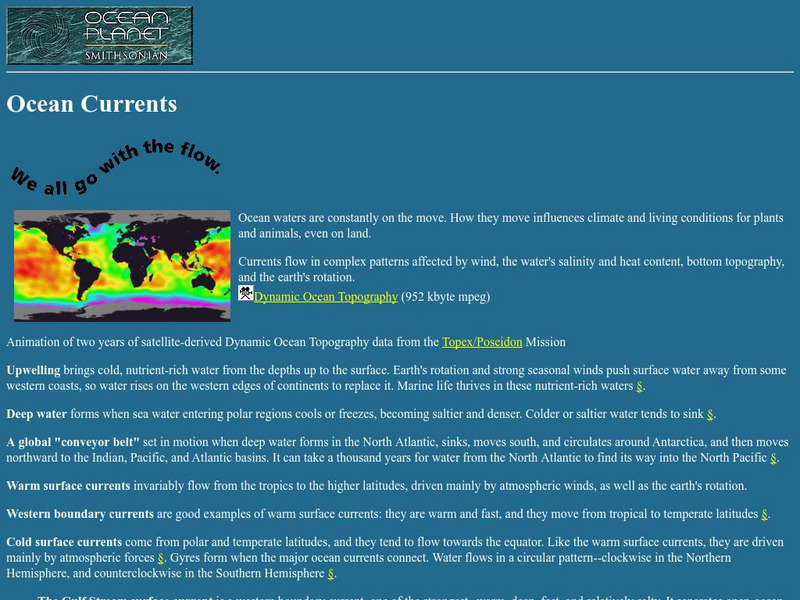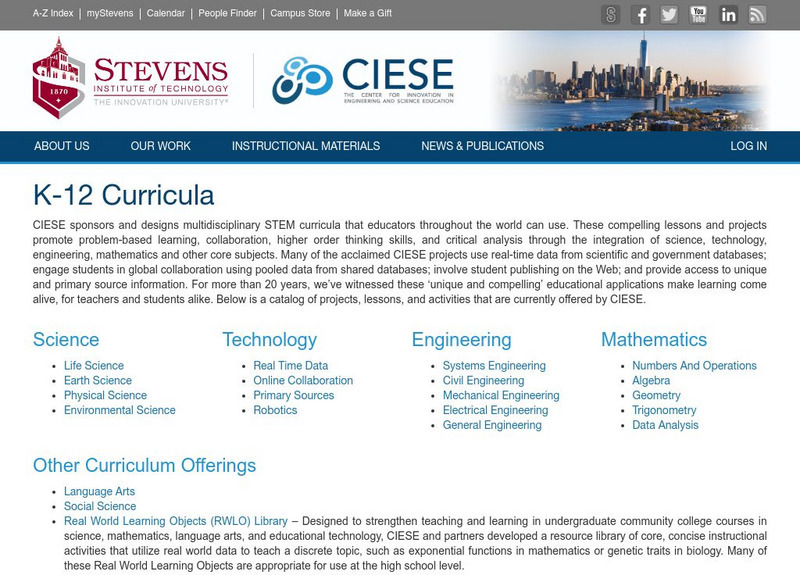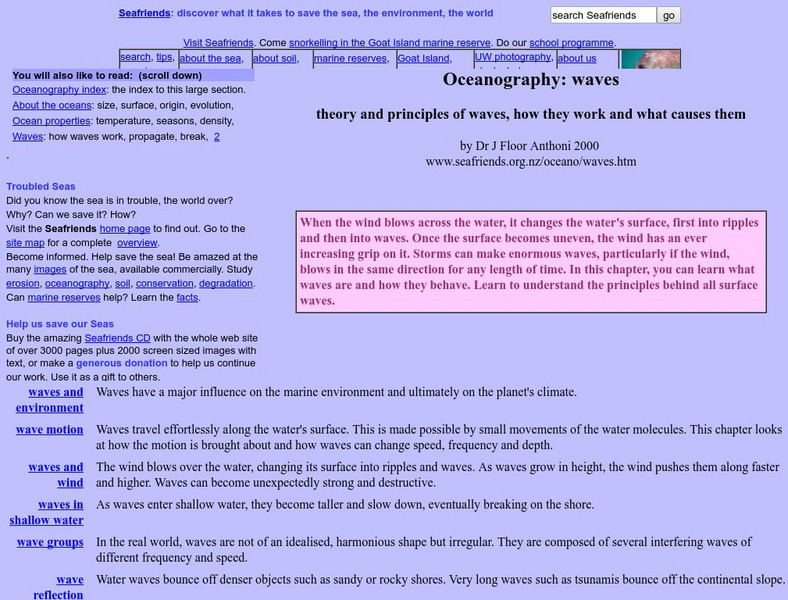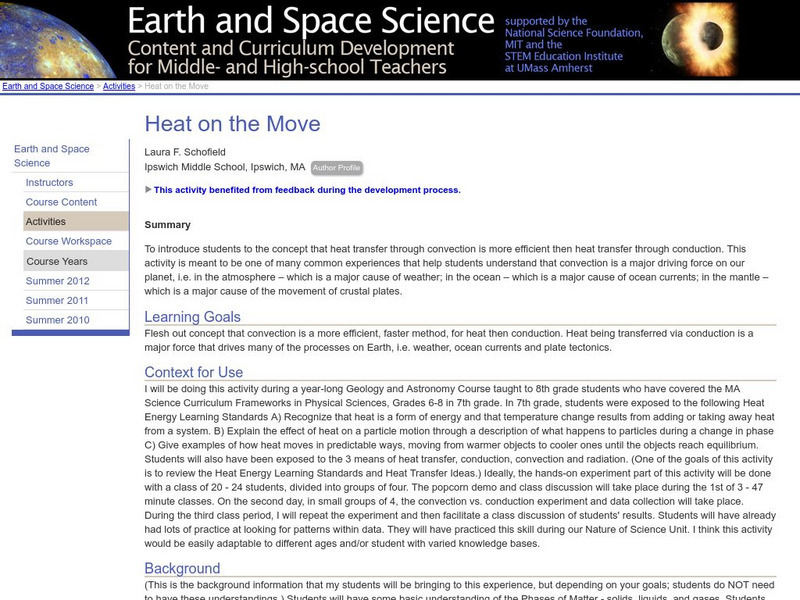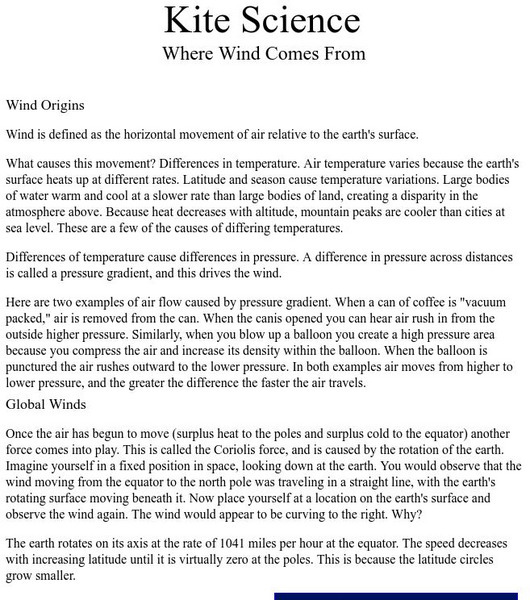NOAA
Noaa: National Ocean Service: Education: Tides and Water Levels
A great resource for explaining and understanding tides. Find out what tides are and why it is so important to monitor them. This is an extensive tutorial followed by a set of review questions. All of the information can be downloaded as...
NOAA
Noaa: National Ocean Service: Tides Online
Coast to coast tide data. Links to state and storm information, historical data and frequently asked questions all about tides.
Texas A&M University
Ocean World: Currents
Get some information about ocean currents on this site. Learn that currents can be driven either by the winds or mixing at deeper levels.
NOAA
Noaa: National Weather Service: Jetstream: Tsunamis
Online school for weather presents an abundance of information about tsunamis. Explore how they form, where they occur, how to prepare for one, and how to survive one. A review quiz and lesson plans are included for further enhancement...
NOAA
Noaa: The Ocean's Role in Weather and Climate
A collection of resources - interactive activities and teacher tutorials - on the impact the ocean has on weather and climate.
Science Education Resource Center at Carleton College
Serc: Lab 5: It's All Connected: Global Circulation
An investigation that is part of a series of lab lessons that expose students to Earth Systems through research, data, and visualizations. During this lab, students will focus on the pathways of wind and water to and from their location...
DOGO Media
Dogo News: Tiny Sea Animals May Drive Sea Currents
New research suggests that very tiny sea creatures in very huge numbers may contribute to the movement of the oceans' currents. Debate and more research are still necessary to prove this. Includes video.
NASA
Nasa: El Nino
A concise explanation of El Nino. Discusses global wind patterns and ocean temperatures. Offers interactive weather-related learning activities.
TeachEngineering
Teach Engineering: One World Ocean
In this activity, students learn about ocean currents and the difference between salt and fresh water. They use colored ice cubes to see how cold and warm water mix and how this mixing causes currents. Also, students learn how surface...
NASA
Nasa: Sci Jinks: How to Escape Rip Currents
Rip currents can be dangerous. Discover what they are and how you can be safe when they are present.
NOAA
Noaa: National Ocean Service: Education: Currents
Illustrated tutorial explains the numerous factors which shape ocean currents. Animations help students visualize how these aspects constantly affect the water movement in the ocean and how scientists use this information to study ocean...
Smithsonian Institution
National Museum of Natural History: Ocean Planet
Detailed website that was a companion to a 1995 traveling exhibit of the Smithsonian. Links to lesson plans and other educational materials are at the bottom of the page. Enter the exhibition to explore the world of the ocean.
Smithsonian Institution
National Museum of Natural History: Ocean Planet: Ocean Currents
The Ocean Planet exhibit at the Smithsonian explains the general features of ocean circulation. A general look at upwelling, deep water, and currents are combined for an overall view.
Center for Innovation in Engineering and Science Education, Stevens Institute of Technology
Ciese: K 12 Education Curriculum: Online Classroom Projects
This site presents projects for individual classrooms and collaborative projects that can be done with other classes or schools. Most of these are science projects.
Woods Hole Oceanographic Institution
Woods Hole Oceanography Institute: Deep Ocean Circulation
What causes the circulation of ocean waters that are too deep to be affected by wind? Find out how salinity and temperature drive the deep sea currents. This resource has several videos and an online quiz.
Other
Seafriends Marine Conservation and Education Centre: Oceanography: Waves
A very detailed article on the characteristics of waves and wave behavior. It discusses the influence waves have on the marine environment and the global climate, the physics of wave motion, the interactions between waves and wind, wave...
National Geographic
National Geographic: Mapping Ocean Currents
An unfortunate spill of 92,000 rubber ducks into the ocean in 1992 elicited invaluable information about global ocean currents as scientists tracked their journeys around the world. In this lesson, students first learn about the Ocean...
PBS
Pbs Learning Media: Great Ocean Conveyor Belt: Part I
This image from GRID-Arendal depicts the major circulation pattern of the ocean, illustrating interactions between temperature, salinity, and depth. Includes a background reading handout and several discussion questions.
Other
Earth Science: Earth's Surface and Heat [Pdf]
This textbook chapter looks at the role of temperature in sustaining life on Earth and on weather and climate. It discusses the Earth's movements and the seasons, the circulation of the oceans, wind and weather, and the water cycle....
PBS
Pbs Learning Media: Wave Action
Students are asked to explain the interactions between the ocean and the shore.
Science Education Resource Center at Carleton College
Serc: Heat on the Move
This activity is meant to be one of many common experiences that help students understand that convection is a major driving force on our planet.
Climate Literacy
Clean: Global Ocean Conveyor Belt
This hands-on activity explores the driving forces behind global thermohaline circulation.
Other
Kites as Education: Wind Origins
This "kite science" site offers information on wind and the atmospheric conditions that cause it. From "Principles of Aeronautics."
Other
Univ. Of South Carolina: Www Tide and Current Prediction
The Univeristy of South Carolina provides predictions for tides and currents from all coasts of the U.S. Also provides useful related links.













